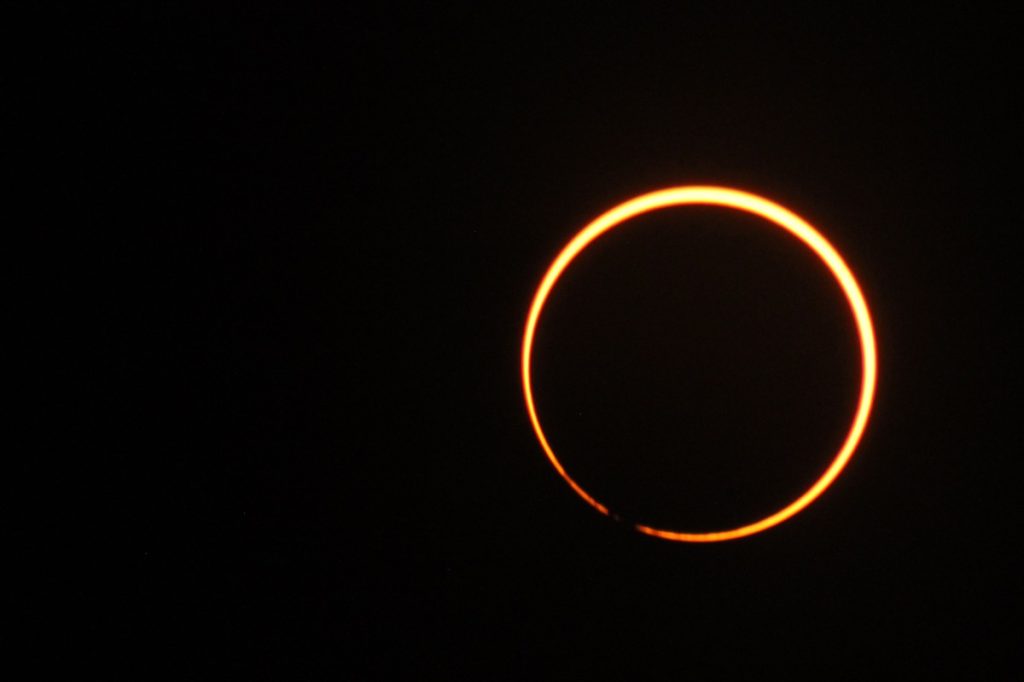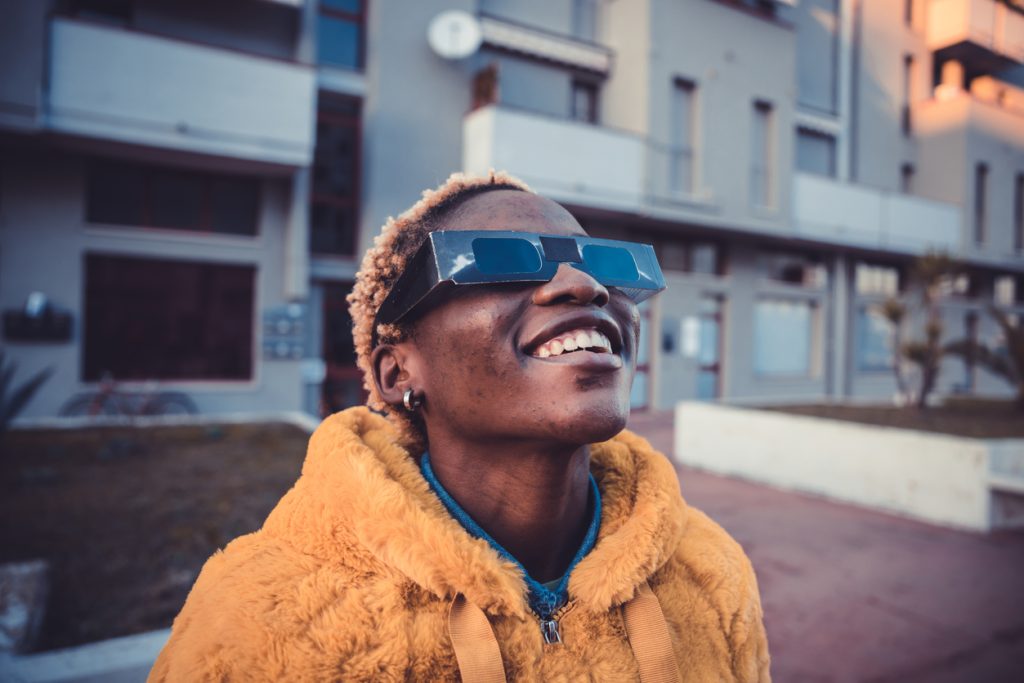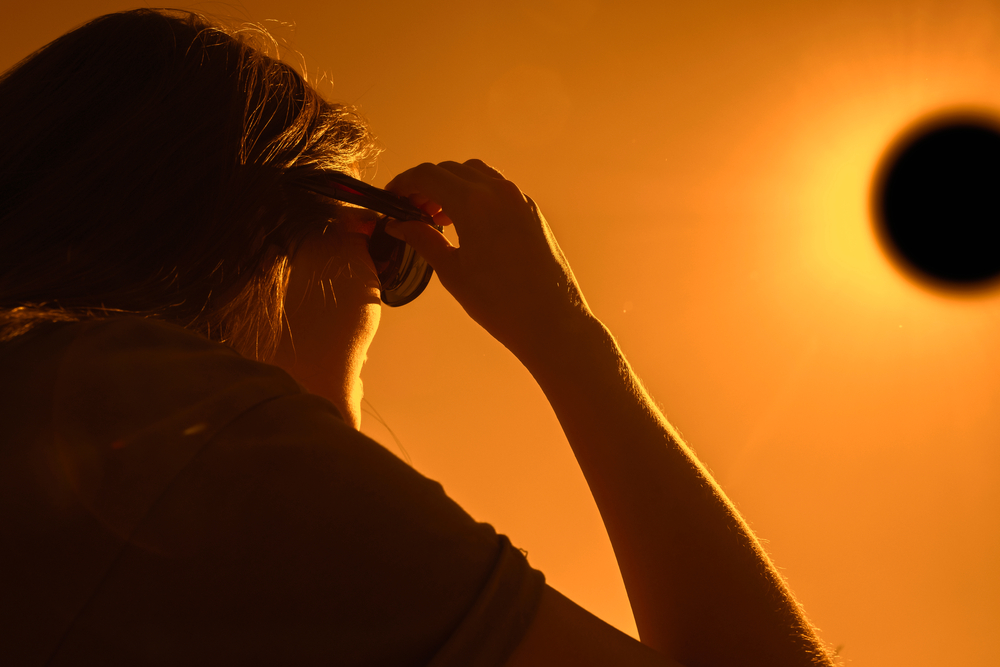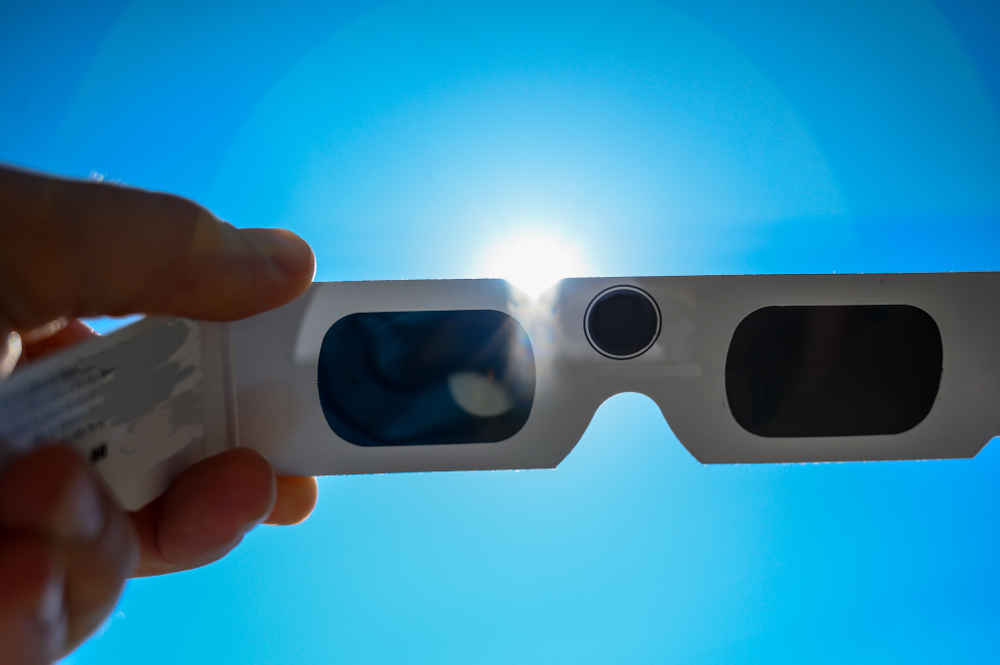Upcoming “Ring of Fire” Solar Eclipse Has Experts Issuing a Safety Warning

Even people who are only casually interested in science and astronomy know that being able to witness a solar eclipse is a special event. Despite being a relatively rare occurrence in and of themselves, viewers also have to be in the right place at the right time to get the full effect. But unlike traditional stargazing or looking up at the moon, they also involve some potentially serious health risks if people aren’t careful. Now, experts just issued a safety warning ahead of a “ring of fire” solar eclipse that will take place in a few weeks. Read on to see how you can protect yourself during the must-see event.
RELATED: The Next Total Solar Eclipse Will Be the Last Until 2044, NASA Says.
An annular solar eclipse will create a “ring of fire” in the sky over parts of the U.S. on Oct. 14.

Even after an exciting summer of memorable meteor showers and a once-in-a-lifetime comet fly-by, there are still more astronomical events to look forward to on the horizon. Arguably, the most anticipated is an annular solar eclipse that will be visible across parts of the U.S. on Oct. 14, according to NASA.
While many people are familiar with the idea of a total solar eclipse in which the moon entirely blocks out the sun as it passes between it and the Earth, an annular eclipse creates a somewhat different viewing experience. Since it occurs at the point when the moon is farthest from our planet in its orbit, it only partially covers the brilliant burning disc overhead and creates a dazzling “ring of fire” in the sky as sunlight pokes around the edges, according to NASA.
Viewers across the U.S. will be able to see at least a partial covering of the sun, but it’s those who live in the path of annularity who will get the full effect. The spectacle should first become visible around 8 a.m. local time on the Oregon coast, passing down through California, Nevada, Utah, Arizona, Colorado, New Mexico, and Texas, according to NASA.
RELATED: Intense Solar Storms May Peak Faster Than Expected—What That Means for Earth.
Experts warn that fake and unapproved solar viewing glasses are being sold.

Of course, watching any kind of solar event requires an extra level of preparation by getting the correct type of eyewear. Solar viewing glasses are necessary to protect your eyes from the sun’s powerful rays—especially during an annular eclipse, which doesn’t have the fleeting minutes-long window of totality that makes it briefly safe to look up during a total eclipse, per NASA.
The excitement leading up to the memorable event has led many eager viewers to order their own pairs in preparation. But before you step outside and look up, experts are cautioning that you should double-check that you’re actually protected.
“You need to have ISO-certified eclipse glasses,” Torvald Hessel, a solar eclipse expert, told local Austin, Texas, CBS affiliate KEYE. “Unfortunately, there are a lot of fakes out there, and then when you look at the sun, you are going to damage your eyes, and if you look long enough at the sun, that damage will be permanent.”
RELATED: The 10 Best Destinations for Stargazing in the U.S.
Using the wrong type of glasses could cause “permanent damage.”

It’s not every day that we make a point to actively stare at the sun. But if you’re not careful, experts say using the wrong safety equipment could quickly lead to serious injury.
“Even after a few seconds, you could get a sunburn to your eyes, so we always recommend wearing approved solar eclipse glasses,” Amy Luu Mai, O.D., a Corpus Christi, Texas-based optometrist told local ABC affiliate KIII. “[Regular] sunglasses are not dark or strong enough to protect you from the sun of the solar eclipse.”
Those who forgo the safety equipment can sometimes be left with lasting problems. “There are many cases of patients having permanent damage,” Mai warns. “Generally, this is a temporary cause of vision loss, but we want to prevent all kinds of eye damage at all costs. We always recommend wearing solar eclipse-approved sunglasses.”
Unfortunately, this isn’t the first time the potentially risky products have been an issue. Counterfeit and fake solar viewers also flooded the market leading up to the total solar eclipse during the summer of 2017, ABC News reported.
RELATED: 8 Amazing Things You Can See in the Night Sky Without a Telescope.
Make sure to buy solar viewing glasses from a reputable source and replace any old or damaged pairs.

If you’re planning on watching the annular eclipse, experts recommend going the extra mile to ensure you’ve got bonafide safety glasses ahead of Oct. 14. According to NASA, certified pairs will comply with the ISO 12312-2 international standard and be printed with the ISO logo on them. But since some fakes will falsely make these claims, being certain might come down to where you shop.
“The only way you can be sure that they’re not fake glasses is to buy them from a reliable source,” Fred Espenak, a retired NASA astrophysicist and photographer, told ABC News in 2017.
Fortunately, NASA has provided a list of trusted manufacturers and suppliers for solar filters and viewing glasses recognized by the American Astronomical Society (AAS). The agency emphasizes that it doesn’t approve or endorse any eyewear itself and that anyone shopping online should take time to check that the seller is listed on the webpage before making the purchase. It also notes that some large national retail chains will also likely have them in stock on shelves.
And if you’re reusing a pair from previous eclipses, you still may want to check you’re not putting yourself in harm’s way. Even though protective viewing filters don’t degrade or expire over time, any scratched or damaged glasses must be thrown away, per NASA.
RELATED: For more up-to-date information, sign up for our daily newsletter.
- Source: https://solarsystem.nasa.gov/news/2332/new-nasa-map-details-2023-and-2024-solar-eclipses-in-the-us/
- Source: https://solarsystem.nasa.gov/eclipses/2023/oct-14-annular/where-when/
- Source: https://solarsystem.nasa.gov/eclipses/2023/oct-14-annular/safety/
- Source: https://eclipse.aas.org/resources/solar-filters